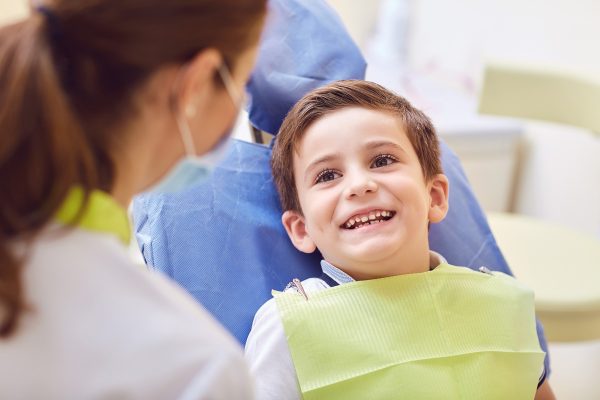Why Are The Primary Teeth Important?
Primary teeth are like training teeth for your kids. They allow for proper eating and chewing, and guide their permanent teeth into their proper places as they develop. They also support proper jaw bone development and allow for proper speech. Normally, several baby teeth last until ages 6-7, while others can last all the way until ages 10-13.
Dental Emergencies
Toothache: Clean the affected tooth area, and rinse the mouth thoroughly with warm water. You may use dental floss to dislodge food that may be impacted. If the pain persists, please call our office. Avoid placing aspirin or heat on the gum or directly on the aching tooth. Use cold compresses for swollen faces.
Knocked Out Permanent Tooth: Locate and hang on to the tooth if possible. You may rinse the tooth with water only – no soap, scrubbing, or unnecessary handling of the tooth. If there are no fractures, attempt to reinsert the tooth into the socket, and use a gauze to have the patient hold the tooth in place. If this is not possible, the tooth should be transported in a cut containing the patient’s saliva or milk. The tooth may also be carried inside the patient’s mouth, only if they are old enough that it will not be a hazard to them.
See a dentist IMMEDIATELY, as time is of the essence to save the tooth.
Knocked Out Baby Tooth: Please contact us during business hours. This is usually not a dental emergency, and no treatment may be necessary.
Chipped or Fractured Permanent Tooth: Quick action may save the tooth, or prevent infection in the event of a chip or crack. Rinse the mouth with water and use cold compresses to control any swelling. If any fragments can be found, bring them with you to the dentist.
Chipped or Fractured Baby Tooth: Contact your pediatric dentist for assistance.
Severe Blow to the Head: Your child should be taken to the nearest emergency room immediately.
Possible Broken or Fractured Jaw: Bring your child to the nearest emergency room, and make every effort to prevent movement of the jaw.
Dental Radiographs (X-Rays)
X-rays are a vital part of any dental appointment! They allow your dentist to see details that are invisible to the naked eye and that will be missed without them.
They are commonly used to locate cavities, yes, but also so much more! They can help the dentist view erupting teeth, identify bone diseases, evaluate the results of an injury, or prepare for orthodontic treatment. Finding potential issues early allows for treatment that is less uncomfortable for children – and less expensive for parents.
Radiographs and examinations are recommended every six months for children with a high risk of tooth decay, per the American Academy of Pediatric Dentistry. Many pediatric dentists request radiographs once yearly, and it’s a good idea to obtain a complete set of radiographs every three years.
What’s The Best Toothpaste For My Child?
While teaching your child good brushing habits is an absolute must for a lifetime of healthy smiles, many toothpastes, and/or tooth polishes can be damaging to young children as they aren’t designed with their sensitive enamel in mind. Toothpastes approved by the ADA will have a label on the box and tube – and are much more suitable for young smiles.
Kids should spit out toothpaste after brushing to prevent ingesting too much fluoride and contracting the fluorosis condition. If your child is too young or unable to spit out toothpaste, a fluoride-free toothpaste or a “pea-sized” amount of regular toothpaste is recommended.
My Child Grinds Their Teeth at Night (Bruxism)
There are many suggested reasons as to why children develop a grinding habit in their sleep – it could be due to stress, or adjusting to new experiences or environments. It also could be due to how your child sleeps. No matter the cause, bruxism is identifiable and, when necessary, treatable.
If excessive tooth wear is present, a mouth guard (night guard) may be used to help treat the condition, so long as the child is old enough where the appliance would not pose a choking hazard.
Thumb Sucking
Thumb sucking is a natural and relaxing habit for infants, which may even help them get to sleep!
As we know, thumb sucking shouldn’t last forever – and continuing the habit after the eruption of teeth can have negative consequences on tooth growth and alignment, though passively resisting the thumb in the mouth will have far less detrimental consequences than sucking vigorously.
Thumb sucking, and use of pacifiers, should stop between the ages of two and four.
- Correcting sources of anxiety can deter thumb sucking
- Providing additional comfort via other methods will also deter the habit
- Refraining from thumb sucking should be rewarded
- Our office is always happy to kindly discuss with your child why thumb sucking is an unhealthy habit
- As a last resort, covering the hand or an appliance from your dentist can be used to deter the habit
What Is The Best Time For Orthodontic Treatment?
The need for orthodontic treatment can be recognized as early as 2-3 years of age – and early steps can often be taken to reduce the need for major orthodontic treatment later in life.
Stage I – Early Treatment: Ages 2-6 years. The main causes of concern are underdeveloped dental arches, the premature loss of primary teeth, and harmful habits that may hinder tooth development. Treating issues in this stage is often successful and can often prevent the need for future treatment
Stage II – Mixed Dentition :Ages 6-12 years. Main causes of concern deal with jaw malrelationships and dental realignment problems.
Stage III – Adolescent Dentition: Ages 12 and up. Deals with permanent teeth and correcting issues with these teeth.


